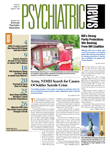Precisely a year ago—in July 2008—all psychiatric hospitals in England were required to become smoke free.
The impact of the new policy on patients and staff is turning out to be for the most part more positive than negative, a study reported in the June British Journal of Psychiatry suggests.
The study was headed by Elena Ratschen, a doctoral student in epidemiology and public health at the University of Nottingham.
To obtain information about the impact of the new no-smoking policy on psychiatric hospitals, Ratschen and her colleagues surveyed human resource directors at 54 mental health trusts that operate psychiatric hospitals throughout England. These were the individuals who were largely responsible for the development of no-smoking policies in the psychiatric hospitals within their particular area.
The human resource directors reported that implementing the new policy did create some challenges. For example, some forensic patients had to be taken outside to secure areas to smoke, which hadn't been the case before. Some patients who had smoked and who were in seclusion had to receive nicotine-replacement therapy. Some staff members, particularly nurses, were apprehensive that the new policy might lead to patient violence or to patients smoking clandestinely and starting a fire. And some staff members did not like having to deal with the aggression and abuse that some patients or visitors displayed when told that they could not smoke.
Nonetheless, the outcome has been more positive than negative, the human resources directors said. None could cite an instance of the policy's leading to patient violence or to a patient smoking secretly and starting a fire. It is reducing smoking among both patients and staff and reducing both groups' exposure to secondhand smoke. Some former smoking rooms have been transformed into health-promoting recreational spaces, which are increasing patients' sense of well-being and behavior. Some patients are sleeping better since they stopped smoking (and drinking coffee) during evening hours.
Many U.S. psychiatric hospitals are also switching to a smoke-free policy, although they are not as far along as those in England are. For example, according to a report in the September 2002 Psychiatric Services, psychiatric units in California, Oregon, Minnesota, Texas, New Jersey, New York, and Kentucky had totally banned smoking. According to an article in the January-February 2006 American Journal of Addictions, 12 of 14 inpatient psychiatric hospitals in the San Francisco Bay area had done the same. And as Steven Schroeder, M.D., director of the Smoking Cessation Leadership Center of the University of California, reported during a recent teleconference, 49 percent of psychiatric hospitals in the United States are now smoke free, compared with 41 percent three years ago (Psychiatric News, May 1).
As in England, the switch here has created challenges—for instance, resistance by staff and patients, especially staff. However, as in England, the switch has brought benefits—for example, less violence and disruptive behavior by patients (Psychiatric News, November 16, 2007).
The study by Ratschen was funded by the University of Nottingham.
